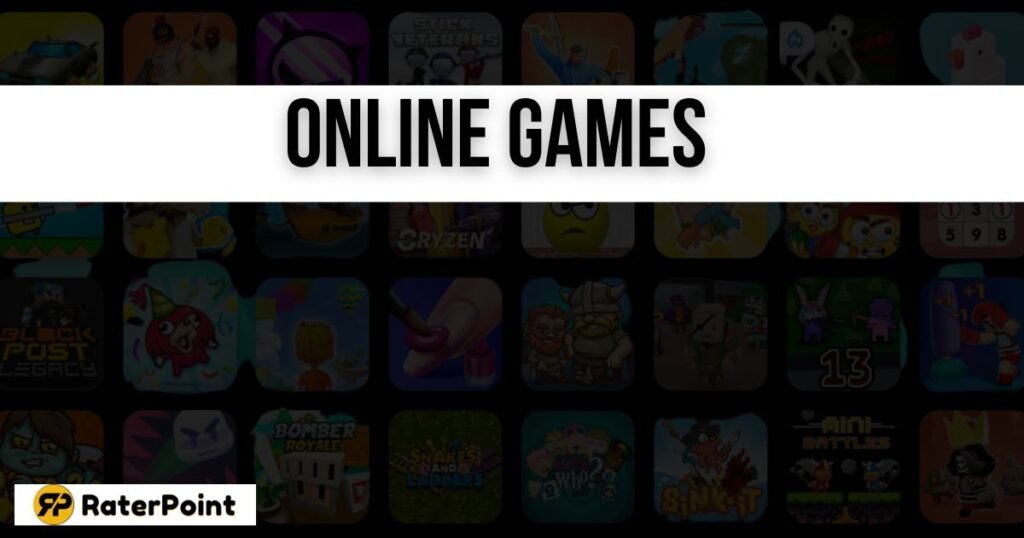Offline Games vs Online Games – Which Is Better?

Over the past few decades, gaming has seen significant shifts. From the beginning, offline games have offered profound, engaging experiences. On the other hand, online games have grown in popularity, joining players from all over the world. Both kinds of games offer players specific advantages and difficulties.
Offline games often emphasize story and detailed graphics without internet needs. Online games foster connectivity and multiplayer experiences but require stable internet. This comparison aims to see how the two differ and how they are similar.
Players can choose the ideal game category for themselves by being aware of these factors. Additionally, this comparison will highlight how each type impacts gaming experience and skills. It will also consider accessibility, cost, and overall enjoyment levels.
What are Offline Games?

Playing offline games requires only an internet connection. They include classic board games that are played with family and friends and need real pieces, such as Monopoly or chess. Many console games, such as single-player adventures, also fall under offline games.
These games focus on delivering an exciting time without internet connectivity. Without any issues or need on a stable internet connection, players may take their time enjoying the game. Games like The Witcher series and The Legend of Zelda are popular offline.
These games stress complex gameplay, complex graphics, and compelling stories. Users can immerse themselves in fictional worlds on their own terms when playing offline games.
Advantages of Offline Games
The key benefit of offline games is that they require no internet access. Players don’t have to worry about connectivity problems when playing their favorite games. For example, traditional board games promote physical interaction between friends and family.
Relationships and lasting impressions are made possible by this social aspect. Additionally, offline gaming provides a distraction-free environment for players to focus on. Users can concentrate more on the game without online notifications or interruptions.
Rich, complex settings and stories are standard in offline games to create a complete gaming experience. Gamers can explore any part of the game and play at their own timetable. Another benefit is that, over time, offline games may end up becoming more affordable.
Disadvantages of Offline Games
One limitation of offline games is the need for frequent updates or new content. Games without internet support may not receive ongoing improvements or fresh experiences. Another disadvantage is the limited scope for community interaction compared to online games.
Players may miss out on connecting with a broader gaming community. Offline games also have a finite number of levels or worlds to explore. Users might not have enough of incentive to play the game again after completing it.
Also, games played offline are unable to offer as much competition as those played online. This can result in a less engaging and challenging play environment. Despite these limitations, offline games remain a popular choice for many players.
What are Online Games?

Online games require an internet connection to play. They instantly link players all over the world. These games come in many different kinds of forms, including mobile games and multiplayer online games (MMOs).
Players can explore large areas and finish targets together in MMOs. The availability of mobile games on smartphones and tablets made them well-known. Multiplayer includes in online games are common, enabling users to join strangers or invite friends.
Clash of Clans, Fortnite, and World of Warcraft are well-known examples. These games contain a variety of categories, such as action, strategy, and role-playing.
Advantages of Online Games
Online games offer global connectivity by connecting players from different countries. They allow for a broad community of gamers to engage with each other. Players benefit from continuous updates with fresh content and new features.
Many online games let players band together for quests or missions remotely. Gamers can build friendships and teams with people living far away. Developers actively update these games to keep them engaging and exciting.
Players of online games can participate in online contests and tournaments. To enjoy interactive gameplay and team techniques, join a guild or clan.
Disadvantages of Online Games
Online games depend heavily on internet connections to function correctly. Players may face lag or connectivity issues if the internet is slow. There can be online toxicity, like bullying or harsh language among players.
Security concerns exist due to potential data breaches or account hacking. Potential in-game purchases and online gaming costs should be mentioned to parents. Accounts that are used without permission run a risk of exposing private information.
Frequent updates might require additional downloads, consuming data and time. Some games may encourage excessive screen time, affecting daily routines or health.
Comparison Factors between Offline and Online Games
When choosing between offline and online games, several factors come into play. Here’s a detailed comparison of key aspects that distinguish the two:
1. Accessibility
- Offline Games:
Since offline games don’t need a web connection, they can be played at any time and from any location. They are available for play on a PC, console, or in physical forms like card or board games. - Online Games:
While online games require internet connections, they can only be performed with a constant and consistent connection. Still, they are accessible on a variety of devices, such as cell phones, consoles, and PCs.
2. Social Interaction
- Offline Games:
Offline games often encourage face-to-face interaction, which builds social bonds within families or friend groups. Board games, for example, foster direct communication and teamwork. - Online Games:
Online games offer global connectivity, allowing players to connect with others worldwide. They promote virtual social interaction, which is ideal for making new friends but lacks the personal touch of offline games.
3. Cost
- Offline Games:
Save with expansions and accessories; the majority of offline games are one-time purchases with no recurring charges. - Online Games:
Online games frequently include unspoken charges like pay-to-play features, in-game purchases, or affiliations (like Xbox Game Pass or PlayStation Plus).
4. Replayability
- Offline Games:
The replay value of offline games is often limited. The game might lose appeal once a puzzle is solved or a campaign is completed. - Online Games:
Online games offer infinite versatility as they are continuously updated with new challenges, content, and seasonal occurrences.
5. Learning and Skill Development
- Offline Games:
Offline games like puzzles and strategy games can enhance cognitive skills, logical thinking, and memory. - Online Games:
Specifically in multiplayer or competitive settings, online games place a high value on interaction, fast decision-making, and creativity.
6. Graphics and Immersion
- Offline Games:
Offline games often focus on high-quality graphics and detailed storytelling, creating an immersive single-player experience. - Online Games:
Online games prioritize connectivity and interaction, sometimes compromising graphical quality to ensure smoother gameplay in multiplayer modes.
7. Dependency on Technology
- Offline Games:
These games don’t rely heavily on external factors like internet speed or server stability, making them more reliable. - Online Games:
Online games can suffer from latency issues, server downtime, or poor internet connectivity, which can disrupt gameplay.
8. Audience
- Offline Games:
Offline games suit family bonding, casual gamers, and those who prefer solo experiences. - Online Games:
Online games cater to competitive players, e-sports enthusiasts, and those who enjoy playing with a global community.
9. Time Commitment
- Offline Games:
You can pause and continue offline games at your own pace, making them less time-demanding. - Online Games:
Many online games involve real-time multiplayer matches or timed events, which can require a higher level of commitment.
10. Risk of Addiction
- Offline Games:
Offline games generally pose a lower risk of addiction since their content and replayability are finite. - Online Games:
Online games can be addictive due to their competitive nature, social aspects, and frequent updates.
11. Variety of Game Modes
- Offline Games:
While diverse in themes and formats, offline games lack the expansive modes and interactions seen in online games. - Online Games:
Online games offer a mix of cooperative, competitive, and sandbox modes that cater to a broad audience.
12. Longevity and Updates
- Offline Games:
Once developed, offline games remain static unless new editions or expansions are released. - Online Games:
Developers continuously update online games with new content, extending their lifespan.
13. Privacy and Security
- Offline Games:
Offline games don’t require internet access, so there’s no risk of data breaches or online harassment. - Online Games:
Online gaming can pose privacy risks, including data theft, hacking, and exposure to inappropriate behavior from other players.
14. Flexibility
- Offline Games:
Offline games offer flexibility, allowing players to pick up or pause a game without worrying about losing progress or internet disruptions. - Online Games:
Online games often operate in real-time, which may limit flexibility and require uninterrupted focus.
15. Competition
- Offline Games:
Offline games typically involve friendly competition among local participants. - Online Games:
Online games foster global competition with rankings, leaderboards, and tournaments, appealing to professional gamers.
FAQs
What is the No. 1 offline game?
The No 1 offline game varies by genre, but many consider chess timeless.
What is the No. 1 game online?
The No 1 online game frequently changes, but Fortnite is very popular.
Can I play online games without an internet connection?
Online games require an internet connection, so you cannot play them offline.
Are there any offline games suitable for multiplayer?
Yes, board and card games like Monopoly and Uno are fun multiplayer offline options.
How do microtransactions affect online gaming?
Microtransactions in online gaming can impact fairness by enhancing player abilities for money.
Do offline games receive updates like online games?
Offline games rarely receive updates; new editions or expansions may provide improvements.
Is it possible to maintain privacy while playing online games?
Secure accounts and privacy settings are two ways to protect your online privacy.
Conclusion
In conclusion, there are unique benefits and difficulties associated with both offline and online gaming. Offline games are reliable, with no internet needed, promoting face-to-face interaction.
They are ideal for solo play and family settings but may lack replay value. Online games connect players globally, providing interaction and continuous updates, attracting competitive players.
However, they may suffer from technical issues and addiction risks. The best choice depends on player preferences and situations. Some prefer the personal interaction of offline games, while others enjoy online gaming’s connectivity.
Gaming is constantly changing as a result of technological advancements, occasionally incorporating online and offline features. Players of all kinds may be enabled to enjoy more varied and realistic gaming experiences in the future.

